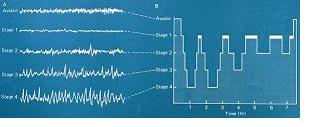|
Sleep: a tranquility of mindArticle submission, Monday 6th November 2006 Sleep is a deception, it is not as simple as the powering down of an electrical appliance which puts it in a state of inert dormancy that ceases any nature of activity, it is in fact quite the opposite. Although in the past this was thought to be the case, we now know better. Without going to indepth, sleep is induced upon us through the gradual buildup of a neurotransmitter chemical during our wake hours called adenosine (this of which was only discovered in 2005 at the University of Texas). Sleep then can best be defined as a state of unconciousness from which we can be aroused as opposed to a coma which is a sleep from which we cannot be aroused.

A full understanding of the `sleep process' has yet to be fully understood. One thing for sure is that it has much intrinsic value to our overall wellbeing both mental and physically. So what is it that happens to us during sleep? Sleep it seems is a very complex process, biologically speaking of course, although for us individually its a simple case of `crashing' after the end of a long day's activity.During our sleep period our brain still remains very much dynamic however instead of concentrating on external stimuli it reverts its attention to internal processes which includes cellular repair work that needs attention and other functions of the system that needs assistance, such as our hormonal system. The nocturnal process goes through various stages which is explained next.
Sleep stages Each sleep state is characterised by differing brainwave activity, and sleep itself consists of a further observable activity known as (NREM) non rapid eye movement and (REM) rapid eye movement (which is usually associated with dreaming) the former (NREM) which accounts for 75-80% of our sleep time is subdivided into a further 4 stages: Stage I (light sleep) Generally referred to assomnolence or`drowsy sleep', the transition zone between wake and sleep in which the brain waves change from the daytime alpha waves to theta waves and we loose partial concious awareness of the environment around us. Sometimes even the occasional `flinching' or body jerks occurs during this brief period. Stage II Conscious awareness of our environment totally disappears. This stage occupies 45-55% of total sleep time. Stage III Brainwaves now change to delta rhythms which takes us into a (SWS) slow wave sleep which occupies 3-8% of sleep time which is a momentary transition phrase for stage IV. Stage IV (deep sleep) This is the deepest stage of sleep which takes up 10-15% of sleep time. The latter end of which brings us into the REM pre-awakening stage in which dreaming can occur and you are beginning to wake from your slumber. The sleep process occurs in approximately 90min alternating cycles of NREM and REM. All of this process goes unhindered whilst we rest, however the one way we can surely know of its importance is when we do not get enough of it. The body does not it would seem simply `write off' much needed sleep should we not give it what it needs, it simply carries it over and over till it finally gets to a breaking point at which it just shuts down completely from absolute total exhaustion.
Sleep Deprivation Nothing will create more mental havoc and psychological chaos than sleep deprivation. It goes without saying the brain is a highly evolved and much complex organ and can be seriously damaged by this torturous process. Once used as a method of extracting information from among POW its a surprise to find that even today in modern society many individuals deprive themselves of a good nights sleep, either through working long hours or even stress from everyday living. Yes I myself have been there and done it also. This will destroy your wellbeing faster than you can imagine, and if you've ever fallen asleep at the wheel of a car (which I have done) you'll know exactly that which I'm talking about. We are all individuals and as such need varying amounts of sleep, and as such are all in tune as to how much we need which is usually approximately around 8 hours. This being the case, should this be cut by only 1 hour a night depreciation in waketime performance, cognitive ability and mental concentration ability will eventually occur, be it ever so slight at first, but it will eventually be payback time. So start counting those darn sheep and get a restful nights sleep.

The good rest and sleeping guide I have heard if you sleep on the end of the bed you will eventually drop off however here are a few good pointers for getting a good nights rest. These are pretty much common sense, however they do work well.
"Sweet Dreams"


|





